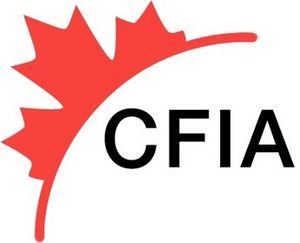Canadian Food Inspection Agency (CFIA) (Customs Glossary)
| This article is part of the Customs Glossary Guide |

The Canadian Food Inspection Agency (CFIA) is a regulatory agency of the Government of Canada responsible for safeguarding the country's food supply, plant resources, and animal health. In the context of cross-border trade, the CFIA plays a pivotal role in ensuring the safety, quality, and integrity of food products, plants, and animals entering Canada. This article defines the Canadian Food Inspection Agency and explores the scenarios in which it is involved when importing food, plants, and animals into Canada.
What is the Canadian Food Inspection Agency (CFIA)?
The Canadian Food Inspection Agency is a federal agency that operates under the authority of the Canadian Food Inspection Agency Act. Its primary mandate is to enforce federal laws and regulations related to food safety, animal health, and plant health. The CFIA conducts inspections, testing, and certification of imported food products, plants, and animals to prevent the introduction and spread of diseases and pests that could impact public health, agriculture, and the environment.
Usage Scenarios of the Canadian Food Inspection Agency in Cross-Border Trade to Canada:
Importing Food Products:
Scenario: A company in the United States exports food products to Canada for distribution. CFIA Involvement: The Canadian Food Inspection Agency oversees the importation of food products to ensure compliance with Canadian food safety standards. The CFIA may conduct inspections, review documentation, and conduct sampling and testing of imported food items to verify their safety and compliance with labeling requirements.
Plant and Seed Imports:
Scenario: A nursery in Europe ships plant material to a customer in Canada. CFIA Involvement: The CFIA regulates the importation of plants and plant products to prevent the introduction and spread of plant pests and diseases. The agency may inspect and issue permits or phytosanitary certificates to ensure that the imported plants meet the necessary health and safety standards.
Animal and Animal Product Imports:
Scenario: A livestock exporter in South America exports meat products to Canada. CFIA Involvement: The CFIA regulates the importation of animals and animal products to prevent the introduction and spread of animal diseases that could affect the health of livestock and public health. The agency may conduct inspections and testing to ensure compliance with animal health requirements.
Compliance and Enforcement:
Scenario: A company imports food ingredients from Asia for use in food manufacturing in Canada. CFIA Involvement: The CFIA enforces regulations related to food safety, labeling, and packaging requirements for imported food ingredients. The agency may carry out inspections, audits, and investigations to verify compliance with Canadian regulations.
Trade and Market Access Negotiations:
Scenario: Canada engages in trade negotiations with another country to facilitate the export of Canadian agricultural products. CFIA Involvement: The CFIA plays a crucial role in providing technical expertise and scientific assessments related to food safety and animal and plant health during trade negotiations. The agency's recommendations contribute to enhancing market access for Canadian agricultural products abroad.
Conclusion
The Canadian Food Inspection Agency is a vital regulatory authority in cross-border trade to Canada, ensuring the safety and integrity of food products, plants, and animals entering the country. By overseeing inspections, certifications, and enforcement of regulations, the CFIA contributes to safeguarding public health, supporting agricultural sectors, and promoting trade while upholding rigorous standards of safety and quality. Importers and exporters engaging in cross-border trade to Canada must adhere to CFIA requirements to ensure a smooth and compliant trade process.
